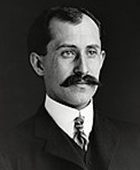Rationale for Inclusion
- Co-Inventor of the Airplane: Orville Wright, alongside his brother Wilbur, is renowned as the co-inventor of the first successful powered airplane. Their historic flight on December 17, 1903, in the Wright Flyer, at Kitty Hawk, North Carolina, marked the first time in history that a heavier-than-air, powered, and controlled aircraft successfully flew. Orville piloted the first of the four flights that day, flying for 12 seconds and covering 120 feet, which began the era of modern aviation. This groundbreaking accomplishment forever transformed human transportation and exploration.
- Pioneer in Flight Control Systems: One of the Wright Brothers’ most critical contributions to aviation was his work on flight control systems, which enabled the Wright Flyer to achieve controlled flight. Orville and Wilbur developed a method for controlling the aircraft in all three axes of motion—pitch, roll, and yaw—using their innovative wing warping system and a moveable rudder. This system allowed for precise control of the aircraft, something that had eluded other early aviation pioneers. The brothers’ contributions to flight control were a significant breakthrough in aviation technology, laying the groundwork for modern flight controls used in today’s aircraft.
- Pioneering Contributions to Aviation Safety: Orville Wright was deeply involved in improving aviation safety after suffering a serious crash during a 1908 flight at Fort Myer, in which his passenger, Lieutenant Thomas Selfridge, was killed. This tragic event was the first fatal airplane accident, and it profoundly affected Orville. He worked tirelessly to enhance the safety and reliability of aircraft, implementing design changes and strengthening the structural integrity of his planes. His focus on improving the safety of flight contributed to the broader development of aviation safety standards that remain a priority in the industry today.
- Post-Wilbur Leadership in Wright Company: After Wilbur’s untimely death in 1912, Orville became the primary leader of the Wright Company, overseeing the production and further development of aircraft. He continued to push for innovations in aircraft design and to defend the Wright brothers’ patent rights in legal battles that shaped the intellectual property landscape of aviation. Orville’s leadership during this period ensured that the Wright Company remained at the forefront of aviation development and helped protect their legacy as aviation pioneers.
- Enduring Legacy in Aviation: Orville Wright’s legacy in aviation is profound and far-reaching. His contributions to flight control, aircraft design, and aviation education laid the groundwork for the development of the modern aviation industry. His role in the Wright brothers’ historic first flight and his continued efforts to improve aircraft performance, safety, and reliability have left a lasting mark on the world. Orville’s work continues to inspire innovation in aviation and aeronautics, and his name remains synonymous with the birth of powered flight.

Biography
- Early Life and Education: Orville Wright was born on August 19, 1871, in Dayton, Ohio. Orville attended high school in Dayton, where his passion for building and designing machinery flourished, though he did not graduate.
- Personal Life: Orville remained close to his brother Wilbur throughout his life, and their partnership would be one of the most significant in aviation history. Neither Orville nor Wilbur ever married or had children, dedicating their lives to their work and innovation.
- Early Career: Orville’s early career began with an interest in printing and mechanical design. In 1889, at just 18 years old, Orville, along with Wilbur, started a printing business, using a press they designed and built themselves. A few years later, the Wright brothers transitioned into the bicycle business, opening the Wright Cycle Company in 1892. By the late 1890s, Orville and Wilbur became fascinated with the idea of human flight, studying the work of earlier aviation pioneers and conducting their own experiments, which eventually led to their groundbreaking success with the Wright Flyer in 1903.
- Over the course of history, Orville received numerous awards and accolades, including:
- Induction into the National Aviation Hall of Fame (1962)
- Induction into the International Air & Space Hall of Fame (1965)
- Receipt of the Congressional Gold Medal (1909)
- Roosevelt’s declaration of August 19th, Orville’s Birthday, to be National Aviation Day (1939)
